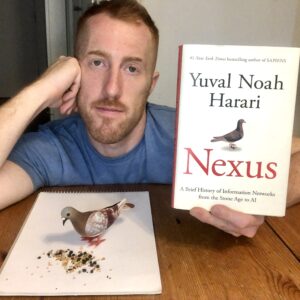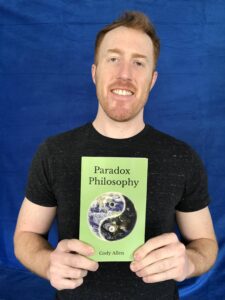 Many of us believe that information is the road to truth: the more of it we have, the faster we can travel to our destination. Harari dispels us of this idea, writing with great detail and providing many examples of his notion that information is meant to connect us. Truth seeking, he writes, is associated with our ability to self-correct.
Many of us believe that information is the road to truth: the more of it we have, the faster we can travel to our destination. Harari dispels us of this idea, writing with great detail and providing many examples of his notion that information is meant to connect us. Truth seeking, he writes, is associated with our ability to self-correct.
In order to govern and regulate a giant number of people, governments must strike the correct balance between truth and order. They typically do this via mythology and bureaucracy, which are “the twin pillars of every large-scale society.” Mythology, because humans must believe in their shared story as citizens of a place (intersubjectivity), and bureaucracy, because the government must know who it’s people are, what they own, and other various information about them so as to aid them in life endeavors. Tax records, property rights, and police files, for example, can be extremely efficient in helping states maintain their power (for better or worse).
The invention of writing was the first way that humans evolved a method for storing and sharing information and it’s implementation went hand in hand with the growth of societies as information could be recorded and revisited at a later date. Whereas we once determined who owned which farm via discussions with our neighbors and friends, writing transferred this information to a central location, stored for the long-term use of whoever was the king in charge of the land. As more and more records were organized and kept for increasing numbers of people, more and more people were tasked with this record keeping, and bureaucracies were formed. This allowed societies to grow in size as greater order was kept, but it also allowed some truthfulness to slip through the cracks: it didn’t matter if everyone in town believed that your farm belonged to you because if someone produced a document that claimed ownership, and the king believed it, it was rightfully his.
As information networks advanced, the balance between truth and order became more and more difficult for governments to achieve. When the printing press was first invented and writing was able to be widely distributed, was humanity entered into an era of greater truthfulness? No; greater truthfulness evolved in tandem with greater falsity. Good ideas were able to be shared faster and farther than ever before, like the concept of personal liberty, but so were bad ideas, like the idea that witches were responsible for societal maladies. It took humanity many years to dispel with the idea of witches, and it wasn’t thanks to our newfound ability to disseminate writing and information: it was due to our collective ability to self-correct. The invention of the printing press gave us books, like the Bible, and millions of people connected under the umbrella of organized religion. Organized religions are great at creating order, but are their doctrines truthful?
When the radio was invented, it made greater amounts of information available to greater numbers of people, and, just like what happened with the advent of the printing press, humanity did not become flushed with more truth, we became flushed with both good ideas and bad ideas. The radio gave both Hitler and Roosevelt the ability to rally their citizens for distinct purposes: totalitarianism and democracy. What do these and other information networks (like the internet, for the most recent example, and the dawning of artificial intelligence) have in common? The ability to connect us in greater and faster ways. The common denominator of new information networks like the printing press and the radio is greater connection, not truth.
This book is inherently a political book as it has to do with how information networks are managed and controlled by governments. Harari makes a clear distinction between types of governments, describing how “democracy and autocracy aren’t absolutes; they are part of a continuum.” The difference between the two is how they balance truth and order, because “just as modern technology enabled large-scale democracy, it also made large-scale totalitarianism possible.” The Soviet Union, for example, maintained a high level of order as all information was centralized and processed in Moscow. As a result, it sacrificed truth. Democracies, on the other hand, are decentralized and predicated on the free sharing of ideas, and while they allow more truth in their governing systems, they maintain less order amongst the populace. We are currently seeing this with the internet’s ability to disseminate more truth to people: government’s are losing their grip and order is turning into chaos.
With this observation in mind, Harari moves on to tackle the most important question of our time: Artificial Intelligence. Whereas bureaucracies were once organized and maintained by humans and eventually computers, never before has one been organized and maintained by a super-intelligent computer. Not only is AI a new and powerful information network, it is also the first one ever created that can come up with new ideas without human input and then autonomously implement them. What does this mean for our search for truth? What happens if an AI supercomputer becomes so adept at its bureaucratic bookkeeping that we humans can no longer understand how it comes to its conclusions about whether or not to approve a loan application or the purchase of a plane ticket?
In order to maintain order as societies grew, humans created intersubjective stories (mythologies) in order to connect ourselves in greater numbers. What might happen if a group of artificial intelligences create their own inter-computer mythologies that we don’t approve of or don’t even know about? What might these AI systems decide to do with this power? “The immediate results of the print revolution included witch hunts and religious wars alongside scientific discoveries, while newspapers and radio were exploited by totalitarian regimes as well as democracies. As for the Industrial Revolution, adapting to it involved catastrophic experiments such as imperialism and Nazism. If the AI revolution leads us to similar kinds of experiments, can we really be certain we will muddle through again?”
The most important thing that we humans must fight to maintain control of is our ability to self-correct. This is, in essence, the scientific method: the ability to test a theory, get some answers, test a new theory, get some new answers, and ultimately change our beliefs. Determining the truth is a process that is often muddled by the means of information networks, and AI will surely make these waters murkier as it continues to do more and more of our thinking for us.


